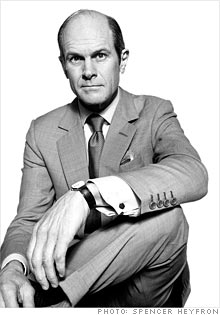(Fortune) -- Practically every company I know wants to come out of the recession competitively stronger. Now, enough time has passed that we can see which demonstrably did and which dismally didn't.
Goldman Sachs vs. Citigroup, Best Buy vs. Circuit City, Honda vs. General Motors, Intel vs. Advanced Micro Devices -- what separated this historic recession's winners from its losers?

A big part of the answer arrives in new research from the Hay Group, which helps Fortune determine our annual ranking of the World's Most Admired Companies and investigates what makes them so successful.
It turns out that this year's leaders -- the industry champs that really did come through the recession on top, such as UPS, Disney, McDonald's, and Marriott International -- differ from the stragglers in at least one way: They actually believe what every company proclaims about people being their most valuable asset.
The contrasts are striking. The winners in this recession, meaning the three most admired companies in each industry, were much less likely than the others to have laid any people off in the past two years (only 10% did so, vs. 23% for their less admired peers). By even greater margins, they were less likely to have frozen hiring or pay. By a giant margin (21 points), they were more likely to have invested the money and the effort to brand themselves as employers, not just as marketers to customers.
Tying all those facts together is one precept: "Most Admired companies display a greater long-term focus than do their peers," says the Hay Group's Mark Royal. That is, they understand that people are an asset, not an expense.
Lest this sound like mere up-with-people happy talk, consider that sentiment's hard financial reality. Putting money into assets is not spending but investing. If you really believe that people are an asset, then you'll keep investing in that asset as long as you think the investment is earning more than the cost of the capital required. But if you believe that people are an expense, like the electricity bill, then in a recession you'll just cut that expense as much as possible.
Hay's new research shows that champion companies focus particularly on making sure employees feel engaged by their work. These firms are much more likely to have specified what employee engagement means, to measure it, to hold line managers (and, significantly, not just HR staffers) accountable for it, and to connect it to business objectives such as productivity, say, or efficiency. Companies that do those things are not only more admired but also much more profitable than others.
So why are many managers still clueless? Often they believe that Wall Street will massacre their stock if they don't thin the herd. Yet research by Darrell Rigby of the Bain consulting firm shows that this simply isn't true. Companies that whack employees as a means of cutting costs (rather than for strategic reasons such as a merger integration) lose more shareholder value over the course of the following year than companies that keep good workers.
Another objection is that the industry champs are so rich they can afford to be magnanimous with employees in a way most employers can't. But what's the cause and what's the effect? Each factor clearly helps the other, creating a virtuous circle.
Which brings us to a deeper lesson from the Most Admired: The industry leaders didn't launch their enlightened human capital philosophy when the recession hit; they'd followed it for years. Once a recession starts, it's too late. Champions know what their most valuable asset really is, and they give it the investment it deserves -- through good times and bad. ![]()






| Company | Price | Change | % Change |
|---|---|---|---|
| Ford Motor Co | 8.29 | 0.05 | 0.61% |
| Advanced Micro Devic... | 54.59 | 0.70 | 1.30% |
| Cisco Systems Inc | 47.49 | -2.44 | -4.89% |
| General Electric Co | 13.00 | -0.16 | -1.22% |
| Kraft Heinz Co | 27.84 | -2.20 | -7.32% |
| Index | Last | Change | % Change |
|---|---|---|---|
| Dow | 32,627.97 | -234.33 | -0.71% |
| Nasdaq | 13,215.24 | 99.07 | 0.76% |
| S&P 500 | 3,913.10 | -2.36 | -0.06% |
| Treasuries | 1.73 | 0.00 | 0.12% |
|
Bankrupt toy retailer tells bankruptcy court it is looking at possibly reviving the Toys 'R' Us and Babies 'R' Us brands. More |
Land O'Lakes CEO Beth Ford charts her career path, from her first job to becoming the first openly gay CEO at a Fortune 500 company in an interview with CNN's Boss Files. More |
Honda and General Motors are creating a new generation of fully autonomous vehicles. More |
In 1998, Ntsiki Biyela won a scholarship to study wine making. Now she's about to launch her own brand. More |
Whether you hedge inflation or look for a return that outpaces inflation, here's how to prepare. More |